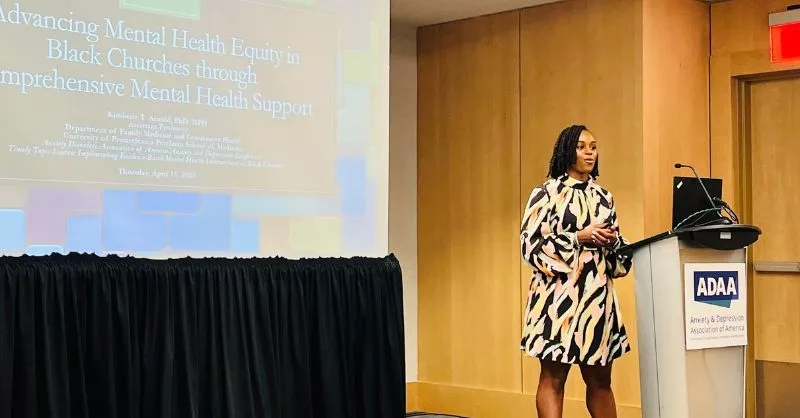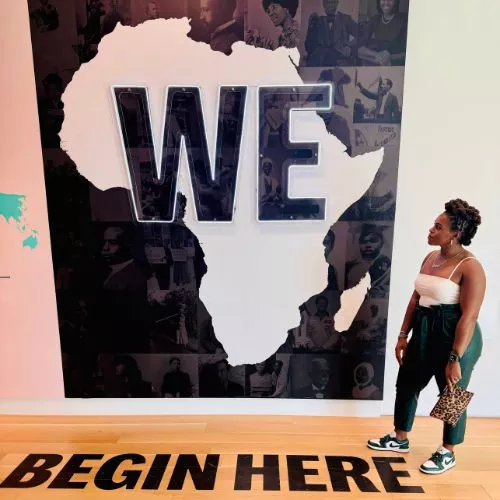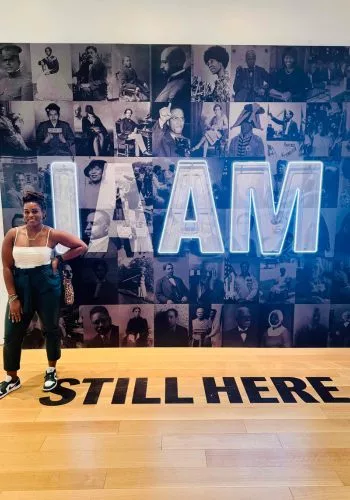“The history of my ancestors is beautifully complex; it is powerful and painful, traumatic and triumphant. We have made and continue to make significant contributions to humankind. As we commemorate Black History Month, it’s essential to amplify discussions around the psychological wellbeing of Black communities by addressing systemic issues, destigmatizing mental health, advocating for equitable access to mental health resources and celebrating the resilience and contributions of Black people throughout history. This approach can contribute to a more comprehensive and inclusive understanding of mental health in the Black community within the broader context of Black history and culture.”
— Dr. Kimberly Arnold

Meet Kimberly Arnold, PhD, MPH, a Mental Health First Aid (MHFA) Research Advisor on our advisory board of respected mental health research experts who assist MHFA USA on research initiatives and the development of MHFA courses. As an assistant professor, mental health services researcher, implementation scientist, public health practitioner and Registered Yoga Teacher, Dr. Arnold is an expert in health equity and using community-engaged research to reduce health disparities experienced by Black Americans. She believes everyone deserves the opportunity to be as healthy as possible.
Dr. Arnold is passionate about improving mental health in Black communities. She emphasizes the importance of openly discussing mental health, reducing stigma, ensuring equal access to resources and celebrating the resilience of Black people throughout history. Dr. Arnold has dedicated her career to using community-engaged research to study, implement and evaluate public policy, health services and community-based solutions to advance mental health equity for Black Americans. In this blog, we’ll explore some of Dr. Arnold’s reflections on promoting wellbeing in Black communities.

“Black History Month provides a chance for us to pause to reflect on the many factors that have impacted the psychological wellbeing of Black communities and the many opportunities that we have to promote our mental health,” Dr. Arnold says. She references Dr. Michelle Sotero’s conceptual model on historical trauma as a framework for understanding unequal health outcomes. The premise of Dr. Sotero’s theory is that populations who have historically experienced prolonged trauma — such as colonialism, slavery, war or genocide — show greater rates of disease prevalence, even many generations after the initial trauma. Mass trauma suffered by Black Americans for hundreds of years has affected the physical, social and psychological results for generations and continues to contribute to health disparities today. It is important to understand how past and present trauma influences the current health status of Black populations in the United States to develop new directions and insights for eliminating mental health disparities.
During Black History Month, we can raise awareness of the mental health challenges that many in the Black community may face and support those in need. Here are some specific ways that Dr. Arnold believes we can do this:
Stigma often prevents individuals from seeking help when they need it. By promoting open conversations and normalizing discussions about mental wellbeing, mental health challenges and types of treatment — especially in places where Black Americans spend a lot of time such as schools, workplaces, barbershops and beauty salons, and churches and other faith organizations — we can create more supportive environments where individuals feel empowered to seek assistance when needed.
Disparities in mental health care access contribute to existing mental health disparities within Black communities. Advocating for policies, partnerships and evidence-based interventions adapted for Black community settings ensures equal access to quality mental health care. In addition to traditional mental health services, it is also important for us to promote wellness and self-care practices that can improve mental health, such as meditation, yoga, eating nutrient-rich foods, consuming less sugar, journaling and practicing gratitude.

This is an important way to promote the psychological wellbeing of Black communities. Black people who are part of the African diaspora are dispersed around the globe. Black history begins in Africa, the cradle of humanity, long before slavery in America. Black people have influenced major civilizations around the world and continue to influence modern cultures. Recognizing and highlighting positive contributions that Black people have made in the areas of science, math, business, architecture, art, agriculture, food, music, literature, health care and beyond can contribute to a sense of pride and empowerment, positively impacting mental health.

Dr. Kimberly Arnold’s dedication to advancing mental health in Black communities inspires optimism that positive change can happen. Her advocacy for open dialogue, destigmatizing mental health, ensuring equal access to resources and honoring the resilience of Black individuals reflects her holistic perspective. By working together, with her example, we can eliminate mental health inequities and enhance the general wellbeing of Black communities.
Stay tuned for part two of this blog post, where we’ll dive into Dr. Arnold’s work and her insights on advancements in the field of community-engaged mental health research.